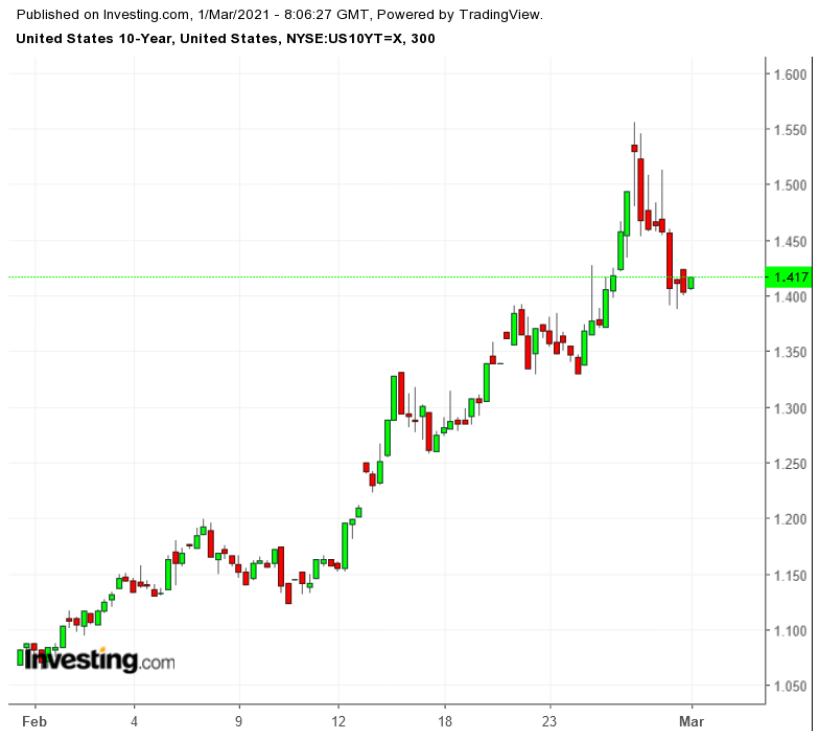Federal Reserve Chairman Jerome Powell is going to have to do a better job than he did during last week's congressional testimony, of convincing investors he means what he says when promising the Fed will not be raising interest rates.
Wall Street paused its bond selloff for little more than a New York minute after Powell’s appearances before House and Senate committees briefly calmed concerns about rising bond yields, indicating higher inflation that would bring a Fed response.
Powell assured lawmakers that the economy is nowhere near meeting Fed targets and implied that the central bank would leave interest rates near zero for quite a while. Prices in hard-hit sectors remain “particularly soft,” he said.
Stocks recovered on Wednesday after his second day of testimony, but headed downward again on Thursday as doubts reasserted themselves.
What seemed like positive developments a couple of weeks ago—more vaccinations, more fiscal stimulus, booming economy ahead—took on a decidedly negative aspect as investors fretted about more government spending, higher debt at higher cost, and faster inflation exacerbated by supply shortages.
Powell, who has not proven very nimble at adjusting policy to reality, told lawmakers that:
“the economy is a long way from our employment and inflation goals, and it is likely to take some time for substantial further progress to be achieved.”
After years of inflation well below its 2% target, Fed policymakers are focused on the other part of their dual mandate—reaching maximum employment.
Bond investors, however, are focused on the Fed’s primary goal of maintaining price stability, as the yield on the benchmark 10-year Treasury note spiked above 1.5% amid a government bond selloff and weak auctions of new debt.
Fed governor Lael Brainard highlighted the focus on employment, saying the actual jobless rate is closer to 10% than the headline 6.3% because 4 million people have left the labor force during the pandemic and others are misclassified because they are working part-time while seeking full-time jobs.
“Changes in labor force participation contain important information about the strength of the labor market that is not captured in the unemployment rate,” she said in a webcast lecture for a Harvard economics class.
While not quite as sanguine as Powell about inflation, other Fed policymakers also played down investor concerns.
“With growth prospects improving and inflation expectations rising, the concordant rise in the 10-year Treasury yield is appropriate,” James Bullard, head of the St. Louis Fed, said in remarks at a Georgia State University seminar.

Bullard made his remarks on Thursday and was looking at a yield of 1.3% on the 10-year note, but investors were unloading Treasuries and driving that yield up 20 basis points by Friday.
The St. Louis Fed chief added that policymakers are happy to see inflation expectations rising because their goal has been to get inflation up to their 2% target and even above it for some time to compensate for the long period of subdued price increases.
Kansas City Fed chief Esther George took a more nuanced view of inflation. In a speech for a Farm Journal summit, she said policymakers can’t look at just the headline inflation rate.
“While some prices are down, other sectors, particularly durable goods, are recording their fastest price increases in decades,” she said.
“In fact, by some measures, the dispersion in inflation across sectors has never been greater, a further indication of the current uneven economy.”
She forecast that overall inflation could “firm up quickly” once more people are vaccinated and demand for some of the disadvantaged sectors recovers. The Federal Open Market Committee needs to closely monitor price signals in various sectors and may have to reconsider “policy settings” once the picture is clearer, George said.
But she, too, considers the rise in bond yields as a reasonable response to growing optimism about the recovery.
“If this is indeed the reason that yields are increasing, they are unlikely to rise to the point of smothering the optimism that led to their increase in the first place, and measures of real yields remain deeply negative and only a touch off all-time lows,” she added.
Powell is scheduled to take part in the Wall Street Journal Jobs Summit on Thursday. Investors will be curious whether he will change his tune or keep singing the same song.
Which stock should you buy in your very next trade?
With valuations skyrocketing in 2024, many investors are uneasy putting more money into stocks. Unsure where to invest next? Get access to our proven portfolios and discover high-potential opportunities.
In 2024 alone, ProPicks AI identified 2 stocks that surged over 150%, 4 additional stocks that leaped over 30%, and 3 more that climbed over 25%. That's an impressive track record.
With portfolios tailored for Dow stocks, S&P stocks, Tech stocks, and Mid Cap stocks, you can explore various wealth-building strategies.
